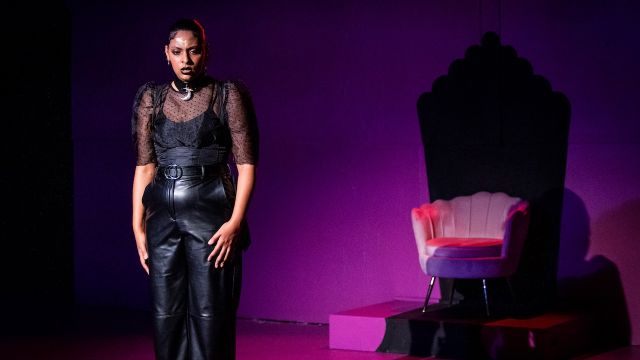Hamlet in the Other Room
‘Though this be madness, yet there is method in’t’. An apt quote by Polonius from Shakespeare’s Hamlet to describe this brilliant piece of theatre from Good Company Theatre. The setting is the final night of an all-female, non-binary production of Shakespeare’s Hamlet. The cast decide that the play no longer serves them, so they seek to destroy it - to create something that does.
This is boldly unconventional theatre, of which Rumpus is queen, so it’s not entirely surprising that before we’re even allowed out of the foyer, we listen to an induction – of what to expect, of what we are allowed to do. Even with permission, it’s confronting to be allowed simply to change seats – or rooms! There are two performing areas: the dressing room backstage (the ‘Other Room’), and the theatre’s stage itself. As the actors move between these areas - you can move with them, or remain behind.

Whilst some run for their cues under the stage lights, those that stay offer a perfect slice of backstage minutiae: you can choose to be literally face to face with the actors, hearing each breath (1.5m away in a Covid-safe world), or you can hang out a little further back, trying desperately to listen to at least two overlapping conversations.
First-time director Zola Allen allows her nine-woman ensemble room to move between the two performing spaces, yet there is little pause or uncertainty that isn’t meticulously planned and executed. Every one of these women are great actors, but as an ensemble they are terrific, endlessly captivating, and it’s impossible to single out one from the collective: Poppy Mee, Chloe Willis, Kidaan Zelleke, Lucy Haas-Hennessy, Ellen Graham, Evie Leonard, Mikayla Rudd, Katherine Sortini, and Erin Perrey. Their backstage personas are deliberately and individually crafted, each with a distinct personality, motivations, values and appearance – and then again on the stage, as the key players of Shakespeare’s tragedy: the likes of Hamlet, Ophelia, Rosencrantz and Guildenstern.

Yet unlike that pair’s comedy, set in the wings of Hamlet (Tom Stoppard’s Rosencrantz and Guildenstern are Dead), this is very much front of stage, in the heart of the play, the wilful destruction of the original text - a fight against the patriarchy that Shakespeare portrayed. Still, The Bard’s words are revered, delivered with meaning and power, even when played out as a bawdy farce or TV news.
The production packs in a massive volume of ideas and takes on too many issues to explore meaningfully in one show, but there is also tremendous insight: there’s a marvellous exchange backstage about how changing gender roles in a patriarchal play can unintentionally bury the misogyny you’re trying to expose. The execution is clever in how the boundaries between what’s on and off stage are increasingly blurred, different metaphors but the same concepts, crossing between Hamlet’s playwright and performers.

The fast, reactive (and occasionally shouty) exchanges within and across the two areas remind you that it’s not just what you see and hear in front of you: stage managing any show is a crazy, busy job at the best of times, but Grace Calabretto must be hugely talented and patient to co-ordinate the performers and crew across both spaces whilst the audience moves around and between them.
Even now, I’m not entirely sure of what I experienced in the final fifteen minutes of the performance – my mind was stretched then and continues to process my still tumbling thoughts and realisations – but it did highlight the incredible power of sound. The superb audio design from Belinda Gehlert and the vocal prowess of the cast, both spoken and sung, delivers an intimate and intense conclusion to the wild cleverness and transformative performance that rarely gives anyone chance to take a breath.

You can’t possibly gather everything that is said and done across both stages, so for each audience member, their experience will differ from their neighbour’s. You will want to see this production more than once, to piece together everything that happens, every action and reaction – and overreaction.
This is a stunning debut from Good Company Theatre, and like the performers in this production, they are forging a new story, taking fate into their own hands. It’s wonderfully unconventional, often hilarious, intense and challenging – and utterly stimulating.
Mark Wickett

Subscribe to our E-Newsletter, buy our latest print edition or find a Performing Arts book at Book Nook.

